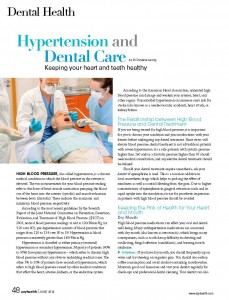 This article first appeared in the June 2014 issue of Ezyhealth magazine. We have reproduced it for the information of those of you who missed it when it was published.
This article first appeared in the June 2014 issue of Ezyhealth magazine. We have reproduced it for the information of those of you who missed it when it was published.
High blood pressure, also called hypertension, is a chronic medical condition in which the blood pressure in the arteries is elevated. The two measurements for your blood pressure reading refer to the force of heart muscle contraction pumping the blood out of the heart into the arteries (systolic) and muscle relaxation between beats (diastolic). These indicate the maximum and minimum blood pressure,respectively.
According to the most recent guidelines by the Seventh Report of the Joint National Committee on Prevention, Detection, Evaluation, and Treatment of High Blood Pressure (JNC7) in 2003, normal blood pressure readings at rest is 120/80 mm Hg (or ‘120 over 80’); pre-hypertension consists of blood pressure that ranges between 120 to 139 over 80 to 89. Hypertension is blood pressure consistently greater than 140/90 mm Hg.
Hypertension is classified as either primary (essential) hypertension or secondary hypertension. Majority of patients (90%-95%) have primary hypertension – which refers to chronic high blood pressure without any obvious underlying medical cause. The other 5% to 10% of patients have secondary hypertension, which refers to chronic high blood pressure without any obvious medical conditions that affect the heart, arteries, kidneys or endocrine system.
According to the American Heart Association, untreated high blood pressure can damage and weaken your arteries, heart and other organs. Uncontrolled hypertension can increase one’s risk for stroke (also known as a cerebrovascular accident), heart attack or kidney failure.
The Relationship between High Blood Pressure and Dental Treatment
If you are being treated for high blood pressure, it is important for you to discuss your condition and your medications with your dentist before undergoing any dental treatment. Since stress will elevate blood pressure, dental treatment is not advisable in patients with severe hypertension. As a rule, patients with systolic pressure higher than 160 and/or a diastolic pressure higher than 95 should seek medical consultation and any elective dental treatment should be delayed.
Should your dental treatment requires anesthesia, ask your dentist if epinephrine is used. This is a common additive in local anesthetic drugs which helps to prolong the effect of numbness as well as control bleeding from the gum. Due to higher concentrations of epinephrine in gingival retraction cords and its rapid uptake into the circulation, its use for prosthetic impression in patients with high blood pressure should be avoided.
Keeping the Pink of Health for Your Heart and Mouth
- Dry Mouth
High blood pressure medications can affect your oral and dental well-being. Many antihypertensive medications are associated with dry mouth, (also known as xerostomia), which brings many consequences such as tooth decay, difficulty in chewing and swallowing, fungal infection (candidiasis) and burning mouth syndrome.
Solutions: If you have dry mouth, you should frequently sip on water and try chewing on sugarless gum. You should also reduce coffee consumption and avoid alcohol-containing mouthwashes. Maintain good oral homecare and visit your dentist regularly for check-up and professional dental cleaning. Your dentist can also apply topical fluoride on your teeth to further reduce the risk of dental caries.
- Gingival Overgrowth
Antihypertensive medications such as calcium channel blockers, e,g, nifedipine, can cause gingival overgrowth. This can give rise to gingival bleeding, pain, difficulty in chewing and poor esthetics.
Solutions: Maintaining good oral hygiene can greatly reduce its occurrence. Sometimes it can also be reversed by changing the antihypertensive medication. However, in certain cases where the overgrowth does not resolve, gum surgery would be necessary to correct the condition.
- Oral lichenoid lesions
Antihypertensive medications could also be associated with oral lichenoid reactions. Patients may sometimes notice an area of roughness or experience a stinging or burning sensation with hot or spicy foods.
Solutions: This condition usually resolves after discontinuation of the offending drug. If the medication could not be changed, lichenoid reactions are treated with topical corticosteroids.
Control Hypertension
In conclusion, most patients undergoing treatment for hypertension can still receive dental treatment, including local anesthetics and anti-anxiety medications unless your blood pressure is too high. Hypertensive patients are advised to monitor their blood pressure readings daily and see their medical doctor regularly for assessment. It is also advisable to make lifestyle modifications, such as reducing salt intake, limiting consumption of alcohol and smoking, and maintaining a healthy weight range to control blood pressure.

Dr Daylene Leong is a dental surgeon with specialist training in Periodontics with Specialist Dental Group®, Singapore. She received her training in the specialty area of Periodontology from the University of Michigan, USA. Dr Leong is a Diplomate of the American Board of Periodontology and a Clinical Tutor with the National University of Singapore. She has a special interest in periodontal aesthetics, gingival plastic surgery and dental implants. For more information, visit www.specialistdentalgroup.com
.





